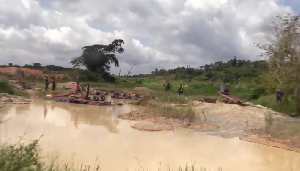2024, has been quite an eventful year, in which the various tribal festivals, from the ADA ASAFOTUFIAM through the Ga Homowo to the OGUA Fanti Festival, have all seen the Asantehene Otumfour Osei Tutu ll grace the occasion along with thousands of Diasporas who flocked to Ghana to experience Ghana’s rich cultural heritage. These colourful spectacles, are graced with lots of music, dancing , cultural displays and the rich cuisine of the people of these area are all enjoyed by the visitors.
Today, diasporans are beginning to think twice about coming to Ghana because of how Galamsey has destroyed almost 70% of Ghana’s water bodies , and alarming reports coming out from the Western, Ashanti, and Eastern regions of the country.
It has been documented that the high levels of chemicals currently found in our water bodies have resulted not only in premature deaths and the deformation of unborn babies, but have also killed marine life in all the rivers affected by this illegal galamsey menace, as well as infiltrated into the food chain, and would surely have an adverse effect on all that eat food grown in these regions. A group of young Diasporas that are in Ghana on a fact-finding mission to see firsthand what the damage is and how it impacts the Ghanaian food chain. Staple food stuffs like cassava, cocoyam, plantains, and even oranges from these regions are all being sampled, and preliminary results are rather damaging and this has led to some key sectors of the Ghanaian community now stepping up to highlight the menace so that stronger policies can be put in place to stop what can eventually become a national security threat when our food security is destroyed.
A young tourist who has been in the country for barely a month has started educating Ghanaian market women by engaging them in discussions on where their produce comes from. And at one of fruit vendors on roads of Accra, the young tourists was seen asking the lady if her Watermelons 🍉 came from the Ashanti , Eastern or Western regions , and went further to explain to the Fruit Seller that if she had said it came from any of those region , she (the tourist) would not have bought it because she doesn’t want any contaminated fruits in her body. Luckily for the tourist , the watermelon 🍉 came from the Ada area , where there are NO GALAMSEY activities . This encounter became an eye-opener to the customer around, waiting to buy some of the fruits.
Our food change is under threat, and Ghanaian leaders seem to play politics with the situation. , but Ghanaians in the diaspora and tourists from around the globe are all watching and paying attention to the developments Ghana is going through as a result of Galamsey. Many are those that would choose other destinations for Christmas because they do not want to visit a country where they would have to worry about which part of the country produced common fruits that they would want to consume.
Dubbed “Dirty December," the December in Ghana festivities would take a hit this year as a result of this, thanks to the various demonstrations and calls to the government to take a decisive step to stop the trend and destruction of our farmlands and water bodies. Event organizers who are silent on this matter must know that if they don’t hold the government accountable, their industry would suffer a lot as a result of Galamsey.
The Diaspora Development Network (DDN) hereby calls on all media houses/platforms to take the opportunity to educate Ghanaians on what can happen if we all don’t get involved with solutions to help save our environment and eventually our livelihoods as Ghanaians.
Opinions of Monday, 7 October 2024
Columnist: Albert Dodoo
Galamsey threatens Ghana tourism - Dirty December 2024 events killed
Entertainment














